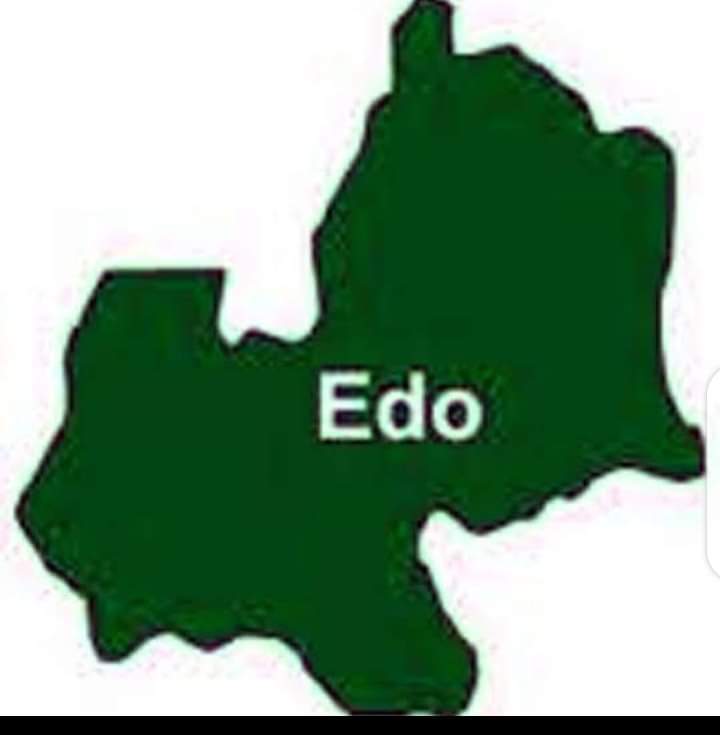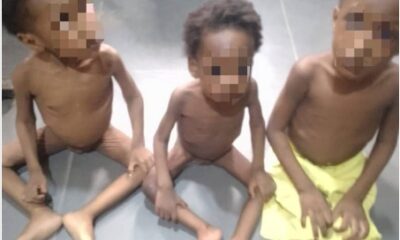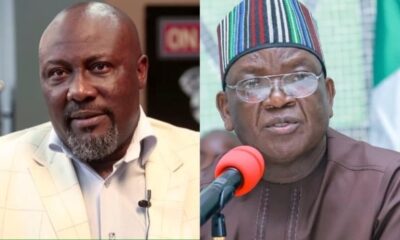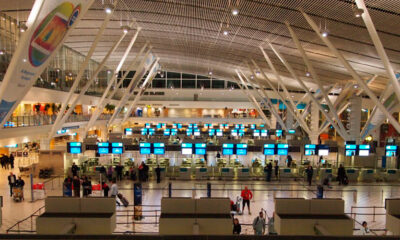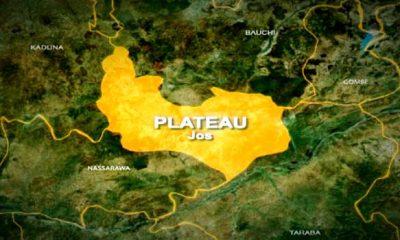Opinion
OPINION: The Unequalled Leadership Of Gov. Ugwuanyi
Published
3 years agoon
By
Editor
By Obioma Nnamani
A saying goes thus “a great captain is not known by sailing on a swimming pool but in a turbulent ocean”.
In the year 2015, at a very difficult time in the history of our nation, when the Nigeria’s economy nosedived into one of the worst recessions in our history, a leader His Excellency, Rt. Hon. Dr. Ifeanyi Ugwuanyi emerged as the newly elected governor of Enugu State, saddled with the enormous responsibility to lead the people of Enugu State.
During his 2015 Inaugural speech, he expressed his firm belief that the God who fed the Five Thousand People with just five loaves of bread and two fishes will also help him during this difficult times.
Meanwhile, the people’s expectations of results are often far more than the resources available to the state. Considering the very lean resources available, it will indeed take the divine help to miraculously meet the expectations of the people. Hence he committed Enugu State into the hands of God.
Today, the overwhelming success of his administration has strongly proven not only his excellent leadership qualities but also the help of God in piloting the affairs of our dear State.
The Prompt and consistent payment of salaries to the state civil servants
The construction of good access roads, especially at the rural areas.
The continuous peace and security in the state, his leadership style, as well as swift and strategic approach to tackling security challenges. These and many more he has been able to achieve seemingly effortlessly.
This great ability to successfully navigate through the difficult times is a clear proof of his unequalled leadership.
I personally believe that such a great leadership skill is what our country Nigeria needs come 2023, and therefore hopes that His Excellency, Rt. Hon. Ifeanyi Ugwuanyi will yield to the growing requests of Nigerians who are calling on him to run for the 2023 presidential election.
Obioma Nnamani is a leadership expert, a former governorship candidate; former National President of Patriotic Youth Vanguard of Nigeria (PYVAN). Former Enugu State Chairman of Peoples Party of Nigeria; former Secretary Inter Party Advisory Council (IPAC) Enugu State and Central Coordinator, Ogbako Ndi Nkanu
You may like

By Lasisi Olagunju
“When you reach home, tell my mother,
Say it was a boa that his son transformed into
And never returned home.”
The actor comes on the stage singing and dancing, his troupe festive around him. He invokes his powers and turns into this and that. Everything he fancies, he becomes.
Then he goes back to man.
The world applauds him.
The man becomes a roof-climbing, banana-eating monkey.
The applaud gets louder.
He turns to a woman – like Bobrisky- complete with all the charm of the seductress; he beckons on men who could dare but none comes forward. He gets no suitor. Then, his drummers warn him: Ilè nsú / T’óbá burú tan/ Ìwo nìkan ní ó kù (it is getting dark; you will be alone if things get bad).
If you are warned, listen to what the world is saying. In his ‘The Poetry of the Yoruba Masque Theatre’, Professor J.A. Adedeji (1978) says better what the bata drums say: “Don’t be careless, evening is approaching/ Aiyelabola; If the worst comes/ You will be left alone to your devices.” The tragedy of man, of all of us, is that we always deny the advent of dusk. The masked one hears the beats and ignores the beats. He takes one more step and turns to a boa – and darkness descends on his performance.
The boa-man struggles with himself. He tries every trick in his bag of charms. He chants every incantation in his pouch; he bellows every shout. He draws blank; nothing works again for the influencer. The world has hacked into the actor’s act; life’s principal coders have changed his password. The boa cannot shed the snake skin and adorn the human costume he came with. Aiyelabola will die a boa.
His troupe sings his dirge; his audience his elegy: “Aiyelabola d’ere, o b’ere lo.”
Defeated, Adedeji writes, the boa sings:
“When you reach home, tell my mother,
Say it was a boa that his son transformed into
And never returned home.”
Tell the world, Aiyelabola d’ere, o ti b’ere lo.
When the ‘world’ is involved in someone’s case, what is customarily ignored attracts global opprobrium; even the ordinarily routine becomes problematic, song becomes abuse, and the key that used to open doors stops working. One day, we will know why the young man called Bobrisky was suddenly taken too seriously by drama-loving Nigeria.
FROM THE AUTHOR: OPINION: For Yoruba Muslims And Pentecostals
The pioneer of Yoruba waka music, Batile Alake, invokes chants in her evergreen songs. In a particular album, she sings about entering the farm through the furrow and escaping the whips of the farm owner by not stepping on his (yam) heaps – poro ni mo gbà/ kí olóko má nà mí/ mo ti dá ebeè kojá. In another song, Batile sings about the unusual and the attention which bigness attracts: “B’érin bá w’ojà á j’ogún àpéjowò omo aráyé (when ponderous elephant saunters into the market square, he inherits the world as his audience).” It is possible that Bobrisky, the actor, got that sense from the quaint world of the spirit of money and fame. On social media and in the social sphere, he was/is news – bad and good news – many times not exactly good. But he enjoyed it and sought to live it in defiance of whatever his world thought. He saw the world as a festival of sort and dressed himself up for it in coarse cottons of disgusting shock. Listening to strange beats, the man danced his way into the moral marketplace as a woman and stepped on the toes of his world.
For breaking a pot of water, the child who repeatedly spilt drums of palm oil without consequences was docked in a court in Lagos some days ago. Bobrisky is in jail for doing what Duro Ladipo calls “ritual theatre”, that which many do impulsively as a cultural practice – spraying money at social parties. In the times of our fathers, ‘spraying’ was not the word; money meant for the forehead never touched the ground. If it did, it was a taboo broken. But, today, àkàrà has become bones in the mouth of the toothless. Money-miss road nouveau riche dudes dance on a canvass of cash to proclaim their success. What autumn does to leafy trees is what they do with the naira. They carpet the ground with careless currency notes, plod rough-shod and record their misbehaviour for us to sorrow about. They incite the poor to query the poverty in their destiny.
I read a piece on “Ritual Killing, 419, and Fast Wealth in Southeastern Nigeria” published in the ‘American Ethnologist’ of November 2001. The author, Daniel Jordan Smith, marvels at what we do here with paper money on foreheads at social parties. He explores the drama of our doing it, how we do it and why we do it: “The act of spraying itself has become a performance, and those who do the spraying are often drawing public attention to themselves as much as to those they are supporting. In the act of spraying, the dance of the sprayer is watched and admired, but most importantly, the quantity and denomination of the bills pasted to the foreheads of the sprayee is closely monitored. People who spray large sums of money are roundly applauded by the crowd…” The paradox (and the lesson) here is what Smith admits: “such ostentation is resented even as it is admired.”
FROM THE AUTHOR: OPINION: Flying Gods, Lying Prophets And Power Bandits
Singer Portable’s ‘brother’ who claims ‘sisterhood’ is a goat immolated to make other goats stop misbehaving. Won pa iji han iji. But, he is just an actor, a masquerader monetizing his mime of our unserious world. And we are really unserious. Of all the inmates in our house of sin; of all the sicknesses in our sick body, Bobrisky is what takes our precious time and judgment. Locking him up is our loss.
A perfect Aristotelian tragic protagonist, he will be in solitary misery for six months at our expense. Everyone thinks he deserves to be where he is. Even those of us who accept that he is just an alárìnjó (itinerant, walk-and-dance masquerade) insist that his choice of style is dirty. But there is neither disgust nor ugliness in drama. It is either a tragedy or a comedy or the concoction in the middle. Everything is about costuming and packaging and marketing. If my good old literature teacher, Professor Oyin Ogunba (God bless his soul), were around and he watched this spectacle, he would describe the man as drama. Read Ogunba in Oyekan Owomoyela’s ‘Give me Drama Or…’ I did. “A masked figure at a festival,” Ogunba argues, “whether he dances or speaks or does neither, has, by his mere appearance, created a situation of potential dramatic value.” The jailed young man has the mask; he has the chant; he has the gait, the dance. He has the drama and an excitable audience. His face and costume are just life-mimicry gone awry. He shouldn’t have suffered an overkill.
In the grove of life’s principals, there are many masks of varying potency. It appears that Bobrisky entered the grove without paying his dues. It is ìbà that saves goat from being tied down as sacrificial lamb. He didn’t do that and lost control of his panel. There is no system the world cannot hack into; the principalities of this plane are code-crackers. They reduced the cross-dresser to a helpless influencer who could not influence the winds from blowing him into jail. It happened to Aiyelabola, the powerful masque-actor who turned himself into a boa for effect but could not go back to the human he was.
The world overtook Bobrisky and locked him up. He thought he could recreate himself to a woman and be crowned queen of the covens. He didn’t learn from Aiyelabola who moved from man to boa and slithered off forever as boa. May we not step on the eye of the earth.
Bobrisky is a metaphor for the hypocrisy of this society of masked men and specialists. He is also a metaphor for self-violation. In court, he disowned his feminine costume and pronounced himself man. He is, in significant ways, a metaphor for a politician called Yahaya Bello. What happened to the cross-dresser is exactly what is happening to the former Kogi State governor. He is being asked by his troupe mates – the igneous caste of his cast – to come out and account for his years in power. There is a big lesson here: An Egungun that is conscious of life out of the mask will behave well, will limit his performance to dance and songs; will carry no whips, and will whip not the helpless.
FROM THE AUTHOR: OPINION: FG’s N90 Billion Hajj Politics
Andu is the name of one Egúngún (eégún) in a Yoruba town which enjoys the throne with the king. Ulli Beier in his ‘The Egungun Cult Among the Yoruba’ (Presence Africaine, 1958: 34) says “Andu enjoys great power and privileges. He may, for example, sit on the king’s throne when the king is not present.” What do you think would happen if this Egungun extends his privileges and starts contesting the stool with the king, the Timi of Ede? The storm and the drama that we saw around Bello last week were what normally happens to temporary men who think themselves permanent. When ‘big’ men eat food meant for the gods and step on sacred toes and the world takes note, they are condemned to run kitikiti katakata as Bello did last week. The consequence he suffers is the fate of the bird called agbe: his feathers got dyed in indigo. The aluko bird was not created henna, his colour was made so by an angry world. When the world felt offended enough by the egret’s unacceptable ways, it dipped the bird in a pot of snow-white chalk. The world is sufficiently angry with the actor called Yahaya Bello; it is cooking a pot of bile for him to feast on.
One Muslim cleric waxed a record in the 1970s with a line that made a lot of sense. I can’t remember the cleric’s name but I can’t forget that he sings about the powerful who think themselves faster than life. But, he says, the world is not that cheap; it storms their sail and sinks their ship. “Won ro pe won le aye won ba/ Aye o je bee/aye da won nu.” The Titanic, its competent crew and its arrogant builders come to mind here.
My people would look at Yahaya Bello and see the opposite of careful chameleon who walks gingerly through life. Chameleon is asked why his feet rarely touch the ground. He says it is in deference to the earth; he says the ground must not cave in under his weight. “This world (aye) is a dangerous and difficult place; it is full of negative forces that hinder, even destroy, one’s life.” Benjamin C. Ray was of the University of Virginia, Charlottesville, United States, when in 1993 he wrote the above quote in a research article on ‘Aladura Christianity: A Yoruba Religion’. The quote, peeled from Ray’s 27-page piece on ‘aye’ and its forces, summarizes what I am saying here about moderation, about doing right and stepping away from wrong even if you have the grit of a lion. Ray is not alone. Professor Karin Barber’s scholarship is on Yoruba’s ways and means. Her mental visage on man and precarious power, published in a journal called ‘Africa’ in 1981, sees the solitary worldly ‘man’ who is “picking his way …between a variety of forces, some benign, some hostile, many ambivalent.”
Did Shakespeare not say justice whirls in equal measure? Today’s eegun, our ensemble of powers and principalities, can also learn from the fate of Bello, a whitened lion in flight. Their own festival of immunity will end one day, and the children of the grove will no longer have free balls of bean cakes. Listen. The antidote to darkness is light. If you don’t want to die a boa, don’t live a boa. What is happening to Bello tells even deities that they are not immune from (and to) the ravages of an incensed world. When the forces of life face and fight a rogue masquerade, they tear off his mask and call women to come and watch. And, of course, an Egungun dies the day he is paraded naked before a coven of weird beings who piss from behind.

By Suyi Ayodele
Date was Monday, August 29, 1955. Oba Isaac Babalola Akinyele, the Olubadan of Ibadanland, sat on his throne. There was an august visitor to be received by the monarch. He had in attendance some of his prominent chiefs like the Otun Olubadan, Chief Kobiowu, and the Ashipa Olubadan, Chief Akinyo. From the political class, Oba Akinyele invited the colourful Adegoke Adelabu of the Penkelemesi fame. It was an important occasion for Oba Akinyele. One of his subjects, a woman of no mean repute, had requested to see the monarch. Adunni Oluwole was not just an Ibadan indigene. She was a force among the political elite of her time. Her pint-size notwithstanding, Adunni was a political juggernaut; she had her own political party, the Nigerian Commoners Party (NCP). The clamour for independence was at its highest then. Adunni Oluwole was futuristic. She suspected that if given independence, the majority of Nigerians would suffer in the hands of the few that would take over from the colonial masters. So, while others were asking for independence, Adunni was of the opinion that the British should not hand over power until the masses were bold and educated enough to confront the monsters that the political class represented. To achieve her aims, she moved from one palace to the other: from one town to another, canvassing and mobilising the people against the clamour for independence. The Yoruba called her party Egbe K’Oyinbo maitiilo.
In the course of her crusade, Adunni wrote to Oba Akinyele, seeking the permission of the Olubadan to come and address Ibadan people on why they should not support those asking for independence. On her arrival, Adunni told Oba Akinyele and the people gathered that if the whites were chased away and the politicians took over from them, the common people would suffer untold hardship. To avoid that, she asked the Olubadan to use his influence and mobilise his subjects not to support the transfer of power from the British colonial masters to the Nigerian slave drivers. But she was not allowed to finish her message. Chief Adelabu (Penkelemesi) was reported to have interrupted her abruptly, almost to the point of physical assault before Oba Akinyele restrained him. Oba Akinyele recognised the toughness of Adunni’s resolve, but nevertheless asked that Adunni should be taken out of the palace and banished her from ever entering the palace. The late Professor Kole Omotoso recorded Adunni’s encounter with Adelabu in a more dramatic form in his book, one of the most authoritative documentations of Nigerian politics, Just Before Dawn (page 200-201). Omotoso called the book faction (fact and fiction). But the Adunni story is fact. Though she died before Nigeria gained independence, events after the 1955 episode have since justified Adunni’s prediction that after independence, a few would become masters and dictators over the majority.
FROM THE AUTHOR: OPINION: Bobrisky And Our Other S/He Offsprings
The Yoruba political, social and cultural set up is egalitarian in nature. It is a race known to have given equal opportunities for both sexes to actualise their potential. In the traditional set up, the position of Iyalode (leader of the women folks), has been as prominent as that of any male chieftaincy title. In some Yoruba towns and villages, occupants of the Iyalode chieftaincy play important roles in the selection of obas. This also underscores the respect accorded women on esoteric matters because the women folk are regarded as an important part of the tripod which governs an average Yoruba community (Oba-in-council, the awos and the owners of the night- our mothers). It is therefore not out of place for women in Yorubaland to rise and speak whenever occasion demands. The likes of the legendary Efunsetan Aniwura, the Iyalode of Ibadan (1829-June 30, 1874), Efunroye Tinubu (1810-1887),; Iyalode Bisoye Tejuoso (1916-1996); Chief (Mrs.) Funmilayo Ransome-Kuti (1900-1978); Mama Hannah Idowu Dideolu Awolowo (1915-2015), who after the passing of her husband, Chief Obafemi Awolowo in 1987, held the Awolowo political dynasty and the entire Yorubaland intact, and the most recent, Iyalode Alaba Lawson (1951-2023), came to mind as some Yoruba matriarchs who used their positions, positively, to project the Yoruba nation to the world.
With the rich culture of decency that the Yoruba women folk have attracted to themselves and the race, one cannot but be worried that in the 21st century, a Yoruba woman can afford to wage a senseless war against her land under the guise of fighting for an independent nation for the Yoruba race. I am talking here about the last Saturday invasion of the Oyo State Secretariat by some miscreants who claimed to be soldiers fighting for the actualisation of an independent Yoruba nation. More appalling in the whole meshugaas, is the claimed declaration of the Democratic Republic of Yoruba (DRY), by Modupe Onitiri-Abiola, who claimed to be one of the widows of MKO Abiola. Shortly after the invasion of the Oyo State Secretariat, Onitiri-Abiola’s video of the declaration of her fanciful DRY hit the internet.
In the four minutes and forty-two seconds video (the version i got), the woman said among other things, in plain Yoruba Language: “We are indigenous people. We are sovereign people; we are ethnic nationalists. We have decided to secede from Nigeria on November 20, 2022. And today, April 12, 2024, we decided to finally leave Nigeria. I, Modupe Onitiri-Abiola, proclaimed the sovereignty of the Democratic Republic of Yoruba today, Friday, April 14, 2024. From today henceforth, Yorubaland has commenced its own republic. By that virtue, it has now become the newest nation in the world…” The video was obviously recorded a day before the invasion of the secretariat. After watching the video, I have been trying to situate what actually prompted her and her backers to embark on such a mission at this point. I have been trying to fathom which Yoruba nation she was talking about. I checked her pedigree; the only thing I could get is her conjugal relationship with the late MKO. So, I asked myself: being Abiola’s wife is now a qualification for one to lead the Yoruba race? Nnkan mà se wa o (something terrible has happened to us)!
FROM THE AUTHOR: OPINION: Can I Tell Our First Lady That Graduates Drive Cabs Here, Too?
No doubt about the fact that Nigeria, as it is composed now, needs restructuring. Nobody, especially anyone who has been following the political trajectory of Nigeria since the collapse of the First Republic on January 15, 1966, will be comfortable with the way things are in the country. The current political dispensation has, since its inception on May 29, 1999, foregrounded, more than any administration before it (civilian or military), those things that divide us more than any hope of unity. The eight years of Muhammadu Buhari in the saddle between May 29, 2015, and May 29, 2023, projected a part of the country above the rest of the nation. The Bola Ahmed Tinubu administration that took over on May 29, 2023, has not fared better. Rather than address the agitation of imbalance in the appointments of personnel into key areas of government that characterised the Buhari government, Tinubu too has gone a notch higher with his one-sided appointments. If Buhari was accused of Fulanising governance to the detriment of other ethnic nationalities, President Tinubu too has shown that he has no fair mind as his Yoruba boys, especially his Lagos and Ogun Alleluyah orchestra, are all over the place. Nigeria indeed has never had it so bad as we have at the moment. The nation needs a surgical restructuring; one that will give equal opportunities to the citizenry without recourse to place of birth, political affiliation and religious creed.
As much as we agree that we don’t have the best of structures at the moment, it is unthinkable that the solution will be a broad day-light secession! The truth is that the last set of nationalists that have ever traversed the Nigerian political landscape were those lofty politicians of the last five years of colonial rule and the first three years after independence in 1960. Before the January 15, 1966, coup led by the late Major Chukwuma Nzeogwu, it was obvious to all discerning minds that Nigeria was “a mere geographical expression”, as espoused by Chief Awolowo in 1947. There is nothing to show that the country has grown into nationhood. Fifty-four years after we fought a needless civil war that claimed over two million lives from both sides, all in a bid to “keep Nigeria one” in spite of the glamourous insertions in our various constitutions- the affirmative cliche of Nigeria being “one indivisible and indissoluble Sovereign State”- we have demonstrated that we have not learnt anything from our history. The elite class has not done anything to promote the unity and oneness of the country. Even the followership, as long as the current events favour us, we don’t give a hoot about how others fare neither do we exhibit any empathy towards those who seem to be holding the short end of the stick in perpetuity. We think more of what is in it for us and our ethnic groups than what is in the overall interest of the nation. That type of orientation breeds nothing but continuous agitation.
FROM THE AUTHOR: OPINION: Kaduna’s Debt And UnEl-Rufaic Silence
When one considers all these, to pray for the oneness and unity of the country becomes an arduous task. Every person of good conscience will agree that Nigeria cannot continue the way it is now. Something must be done to address the various agitations across the nation. When a Fulani man is at the centre, the Yoruba man is not happy. When it is the turn of the Yoruba man, the man up north feels that he is being short-changed. Yet, the third leg of the tripod, the Igbo race, is left in the cold to suffer its fate. We fought a war for 30 months. We ended the war and affirmed that: “there is no victor; there is no vanquished”. Over five decades after the ‘affirmation’, we still see the Igbo as “those who attempted to break away’, and as such, not fit to be number one in the country. This is the kind of feeling that emboldened last Saturday’s thoughtless action of Modupe Onitiri-Abiola. However, we cannot but caution Onitiri-Abiola that this is not how to be a heroine. She could read more about how Mrs. Olufunmilayo Ransome Kuti led the Egba women on October 5, 1946, and Nwanyereuwa, led the November 18, 1929, Aba women’s riots. Those were great women in their own right.
My greatest concern in the current matter is that it happened in Yorubaland. With our sophistication, cosmopolitan outlook and enlightenment, it beats one’s imagination that a group of people would wake up, arm themselves and march to the Oyo State secretariat to “take over” the place. One of the things that came to my mind is that if, for instance, those DRY ‘soldiers’ had succeeded in taking over the Oyo State Secretariat, what follows? Would that have meant that their gang members in Ekiti, Ondo, Osun, Ogun and Lagos States would replicate the same? How many men do they have? What is the size of the arsenals? What a joke! But who do we blame for this charade? How long have we been asking that the Yoruba elders should put their house in order? How long have we been clamouring that Afenifere should detach itself from the apron of Yoruba political marauders- the very ones who believed in restructuring before they got to power but would not touch the same ideology with a 10-foot pole while in government? How did Baba Ayo Adebanjo feel when he read the news of the Ibadan invasion; what agitated the mind of Pa Reuben Fashoranti on seeing the video of Onitiri-Abiola’s ‘proclamation’? Is this the Yoruba of their dreams, a nation without leaders? I would not bother about Professor Banji Akintoye, leader of the Yoruba Nation self-determination group’s response to the Ibadan event. Those sages who warned us not to show the young folks the length of the phallus so that they don’t begin to think that everything that is long is an object of procreation are absolutely right. Like they say on the streets: Akintoye go explain tire.
Above all, the last Saturday incident in Ibadan is a wake-up call to the nation’s leadership. They should be worried that that type of thing can happen in Yorubaland. Whether it resembles ‘gate’, or it does not resemble it, one is advised to set a trap for it (Ó jo gàté kò jo gàté àwòn laa dee de). Who knows who has copied the template? How many of us in Yorubaland ever thought that something close to that could happen in our backyard? When the Indigenous People of Biafra (IPOB) started its agitations, what name did we not call them? The nation must do something before we have a conflagration in our hands. Beyond punishing those behind the Ibadan saga -, and I think they should be thoroughly punished- we must address the factors that are responsible for such reprehensive behaviour. It should not be dismissed as one of those things. It is obvious that Nigeria needs restructuring in all aspects. Any further delay will bring more of Onitiri-Abiola’s type of ‘proclamation’. Truth is, many are waiting in the wings to follow suit. It was the Igbo the other time. It is Yoruba now. Who knows who is next?

By Lasisi Olagunju
The audience at the 1903 (third year) lecture of the Royal African Society in London listened with rapt attention as African nationalist, Dr. Edward Blyden, took them back to antiquity when “the most enlightened nations of Greece, Asia, and Egypt” held the opinion that “God revealed himself only in Africa.” Great men of that period, including Alexander the Great, rushed to the great oracle of Africa to drop offerings and “learn the will of God.” A few centuries after that epoch, Blyden lamented, Africa, the “first home of God” where He “buried His great truths” had travelled full circle and had come to be identified by the ‘civilised’ world of the 19th century as “the last home of the devil.”
“Now, things have so changed that it is the opinion of some that God is everywhere except in Africa,” Blyden agonized in the lecture which was on ‘West Africa before Europe.’ He went on to predict that “Africa’s turn will be sure to come again” when it would reclaim its place as the “refuge for seers who see and for prophets who prophesy.” Blyden said when that time would have come, an utterly materialized and exhausted Europe would go back to Africa to learn about God. The lecture is in the July 1903 edition of the Journal of the Royal African Society, Volume 2.
Just a hundred years after that lecture, the Blyden prophecy has come true. We’ve reclaimed our place as “the first home of God”. Nigeria, which houses the highest percentage of Africa’s population, qualifies to be celebrated as the global “refuge for seers who see and for prophets who prophesy.” Across faiths, we incubate and hatch men of God and gods of men – in their thousands. We speak and act for God here without counting the costs.
There is something cool about setting precedents. The immediate past Oyo State Governor, the late Abiola Ajimobi, won a second term election in 2015 and pronounced himself Koseleri (it-has-never-happened-before). Nigerians enjoyed an unprecedented three-day leave from work last week. In some places, the holiday lasted the whole of the week. The abstinence from work was the country’s way of celebrating Muslims’ 30 days of total abstinence from day-time meals – and from all sins. Allowing one abstinence to provoke another abstinence made all of us pious and sinless. It was surreal. The holiday should have endured till eternity.
While the holiday lasted, some friends shared their sallah experiences with me. They thought another koseleri was happening in Yorubaland: their pentecostal Christian neighbours refused to eat their food. “They said it was sin to share in our feast,” one of them said, sadly. “That was not who we are”, another added. I told them it is not really a new strain in Yoruba Christianity. I have RCCG and Deeper Life friends who celebrate and dine with me during Ileya. I also have RCCG and Deeper Life friends in whose mouths our good old eran Ileya (sallah ram meat) has lost its holiness. The twists started before the close of the last century when pentecostal Christianity came in costumes of fundamentalism.
READ ALSO: OPINION: FG’s N90 Billion Hajj Politics
Can the Yoruba Christian really avoid sharing things Islamic? If you are a pentecostal Yoruba Christian and you will see it as a sin to celebrate the next Sallah with me, what you will need to throw away will be more than my food. You will stop praying entirely in Yoruba because almost all the key words in the established Christian payers are taken from Arabic/Islamic texts. You will stop calling prayer ‘adura’ because it is from the Muslim ‘Du’a’. You will stop using the word ‘aanu’ (mercy) because the word is rooted in an Arabic word. A new word has to be coined for alafia (peace, wellbeing) because its root is also Arabic. Sermon will stop being called ‘iwaasu’ because it is from the Arabic ‘wa’z’. You will, furthermore, need to change your wardrobe and come up with new designs beyond what you call Yoruba dresses.
British Africanist J.D.Y. Peel’s ‘Christianity, Islam and Orisa Religion’ published in 2016 addresses some of these on pages 162 and 163. It says the agbada dress which you proudly assert as yours is a donation from Islam, perhaps from persons more northerly than northern Nigerians. Anglican missionary, Henry Townsend, in 1847 saw agbada’s acceptance and growing popularity and wrote that the “Mohammedan costume is become very fashionable with the young and gay” and “is by no means put on as a religious peculiarity.” If you read David Heathcote’s ‘The Embroidery of Hausa Dress (1977), cited by R.O.R. Kalilu’ (1997), you will have a clue that the embroidery (jakan) on your agbada “developed from Mali (and) is associated with Quranic scholars and teachers.” You must have heard the saying: Ise agbada kii se Imale (poverty of lack of agbada does not afflict a Muslim). I heard that from the genius of Yoruba Sakara music, Yusuf Olatunji.
There is no escaping the oneness of the world. Do the anti-Muslim pentecostal realize that Bible chapters and verses are numbered in Arabic numerals 1,2,3 etc. The word, ‘Algebra’ is from the Arabic al-jabr. Indeed, the whole “method of equation solving” in Mathematics is from Arabic.
When we speak about what Lord Lugard did with Southern and Northern Nigeria in 1914, we use the word ‘amalgamation.’ Scholars have agreed that ‘amalgamate’ descends from the Arabic al-malghama which means what ‘amalgam’ means.
In your everyday lives, you can’t escape words that have Arabic ancestors. The ‘sugar’ in your tea is from the Arabic word ‘sukkar’; cotton is from ‘qutum’, your overcoat got its ‘jumper’ name from the Arab’s ‘juppa.’ We can go on and on and conclude that it is pointless and fruitless for my Yoruba pentecostal friends to seek to run away from dining with Muslims and their Islam.
FROM THE AUTHOR: OPINION: Tinubu, Matter Don Pass Be Careful
Now, the insular Christian has ideological bedmates in Yoruba Islam. There is this Imam in Ogbomoso shown online last week emitting fire and pronouncing everyone outside Islam as hell-bound. His voice was divisively loud and his penal tongue baleful. I listened to him and wondered where he was coming from. I once discussed clerics like this with the late Alaafin of Oyo, Oba Lamidi Adeyemi. “Taa lo ko won ni kewu (who taught them Quran/Arabic?)” was the oba’s rhetorical response to our worries. True, we should ask questions of competence when we hear such papal pronouncement from supposedly learned people. What he said was not what my Mallam taught me in Madrasha. If God had willed, He would have made all of humanity to belong to one nation (see Quran 5:48; see Quran 42:8); and one religious community (Quran 16:93). But, in His wisdom, God didn’t; instead, “to every people”, he sent “an apostle” (Quran 10:47). The Yoruba forbid saying or hearing what that Imam said about other religions. It is unYoruba to speak the language of perdition – they say man is not God.
It is in the character of the Yoruba to celebrate persons who speak with decorum. The highly regarded, thoughtful Chief Imam of Offa, Alhaji Muhyiddin Husayn, was at a Laylatul Qadr event in Ogbomoso a few days to last week’s sallah. His sermon at the programme was a tour de force on how to have a calm sea of peace. I heard him warn against unguarded utterances. He told the Chief Imam of Ogbomoso to win acceptability with character and close his running tap of hot words: “It is when you stop uttering words that words will stop uttering themselves,” he told the Imam. He added that bad words can’t win wars: “if you’ve seen war before, you will fear war” and “war knows no friend.” He cited examples with his own ascendancy experience. “The years I spent warding off attacks were enough as a man’s full tenure,” he said. But, he added, you would win if your tongue is bridled, if you do right and respect elders and pay hate with love. “One can gain an office with force”, he counseled, “but it takes patience and wisdom to sit there in peace.” Words, they say, draw kola nut from the pocket and can also draw sword from the pouch. The consequence of not listening to reason is having one’s milk spilt and the mug broken.
Ask master-potters if refiring can make whole again a broken pot. It is there in the experience of our fathers that a pot once broken, cannot be mended. There are several lethal pronouncements in Yoruba history with the pot metaphor at the centre. That is why we emphasize peace and unity in all our affairs.
The story of Islam and the Yoruba is the story of how leaf becomes soap. Scholars from the earliest of times have always marveled at how the Yoruba seamlessly combine opposition and accommodation when it comes to religion and religious matters. Fundamentalist Christianity and radical Islam have neither comfortable bed nor cushion seat to relax and flourish in Yorubaland. And they won’t tomorrow. There is no family without both Muslim and Christian wings. In books and arts, we encounter moderation and cross-religious handshakes that emphasize the Yoruba moderation in matters of faith.
FROM THE AUTHOR: OPINION: Kumuyi, Tortoise And Looters Of Noodles
I read Gbadebo Gbadamosi’s ‘Odu Imale: Islam in Ifa Divination and the Case of Predestined Muslims’ published in the Journal of the Historical Society of Nigeria, June 1977. In it, I encountered discussions on Ifa verses which tell us of Yoruba Muslim clerics, “their dress, travels, and the patronage which they enjoy from the people.” Ifa speaks of “Babamale ‘Bewu gereje/ti yio fi gbogbo aye se ofe je (the Muslim man/ who wears voluminous garment/ who will have the whole world as free bounty).” I read Razaq Kalilu’s ‘Bearded Figure with Leather Sandals: Islam, Historical Cognition And the Visual Arts of The Yoruba’ ((1997). Here, the author asks the reader to note earlier works which suggest that Sango, the third Alaafin of Oyo, was “favorably disposed to Muslims” to the extent that he got an oriki: “Ogbori odo s’aluwala ‘male (He that sits on a mortar to perform ablution like the Muslim.”
Whether Christian, Muslim or nothing, humanity is one – or supposed to be one. One hundred and fifty nine years ago, Harvard-trained American scientist, Pliny Earle Chase (1820-1886), sought to use similar words and word-sounds found in Yoruba and other ‘world’ languages to prove what he called the “universal brotherhood” of man. In a 39-page seminal article published in an 1865 edition of the ‘Transactions of the American Philosophical Society,’ Chase did a painstaking comparison of some Yoruba words and word sounds with some others found in Arabic, Latin, Greek, English, Hebrew, Chinese, German, Coptic, Gothic, French, Dutch, Egyptian, Italian, Finnish, etc languages. He examined similarities in sound and meaning of prefixes, suffixes and midfixes found common across Yoruba and those other languages. He, in particular, draws our attention to what he calls “the marvelous grammatical affinity that exists between the Yoruba, Egyptian, and Coptic Languages.” Copiously using T.J. Bowen’s ‘Grammar and Dictionary of the Yoruba Language’, he argues that it could not have been mere fortuitous occurrence of coincidences that “auro” (owuro)- morning/dawn in Yoruba is “aurora” (dawn) in Latin, just as “awari” (search) in Yoruba shares sound and meaning with the English word “aware”. He writes that there is “oro” (wealth) in Yoruba just as its Latin sound-mate, “aurum”, means gold. Chase notes with considerable interest that the word ‘duro’ means “to stay” (or stand firm) in Yoruba, and ‘duro’ in Latin means hard, harden, toughen, become stern. Incidentally, I also found that there is a similar Hebrew word, ‘dura’ which, among others, means ‘endurance.’ Chase’s conclusion is that humanity is one vindicating the Biblical assertion that “God hath made of one blood all nations of men to dwell on all the face of the earth” (Acts, 17:26).
The world lounges under a fatal canopy. You should be following the escalated bloodshed in the Middle East. The standards and the double standard. It may still get worse. Just as it is in Shakespeare’s Julius Caesar, carrion birds are hooting at noon; ravens, crows and kites are flying above the “sickly” world. But, what we need is love to defeat war. And, we will have this if we are able to take care of the devil in race and religion. It is difficult. Daniel Defoe, in his ‘The True-Born Englishman’ (1701) writes that “Whenever God erects a house of prayer,/ The Devil always builds a chapel there; /And ’twill be found, upon examination (that) / The latter has the largest congregation.”

Edo Guber: Why I Want To Become Governor – APGA Candidate, Osifo

Edo Guber Final List : Group Knocks LP, Commends, INEC, Yakubu

Cable Theft Soldiers Dismissed
Trending

 News4 days ago
News4 days ago‘Have Some Conscience’ – Lady Tackles Salvation Ministries Founder, Ibiyeomie, Over 20% Of Salary As Offering Preaching [VIDEO]

 News5 days ago
News5 days agoEdo Commissioner Stripped Of Chieftaincy Title For Disrespecting Throne

 News4 days ago
News4 days agoAPC Debunks Viral Video, Says Presidency Not After Ganduje

 Metro4 days ago
Metro4 days agoPolice Rescue Three Toddlers Locked Up In Lagos Home

 Headline5 days ago
Headline5 days agoWoman Who Took Dead Uncle To Bank To Secure Loan, Arrested [VIDEO]

 Headline5 days ago
Headline5 days agoJUST IN: Chief Of Defence Forces Involved In Chopper Crash

 Politics5 days ago
Politics5 days agoPDP Crisis: Drama As Dino Melaye, Ortom Exchange Words During Meeting [VIDEO]

 Politics2 days ago
Politics2 days agoEdo Guber: Akoko-Edo PDP Leaders Meet In Igara, Describe Ighodalo, Ogie As ‘Perfect Match’

 Headline4 days ago
Headline4 days agoBest Airports In Africa For 2024 Named, Nigeria Missing [Full List]

 Metro4 days ago
Metro4 days agoBREAKING: Protests As Gunmen Kill 12 In Plateau Village








